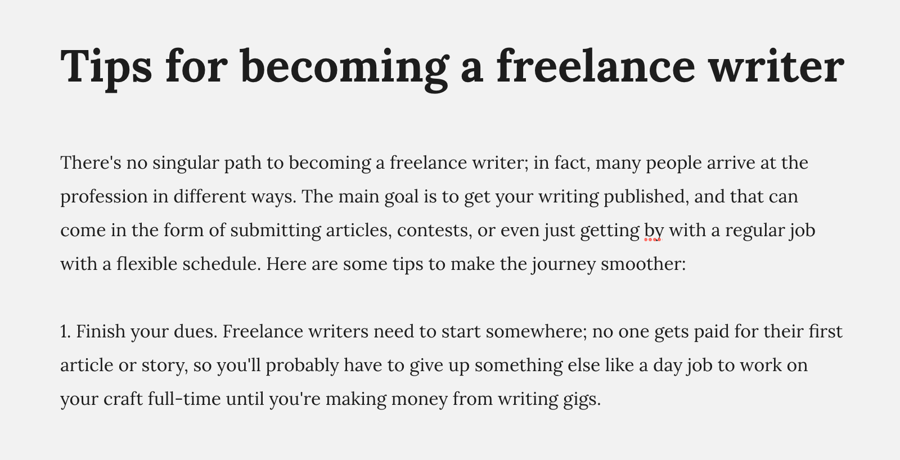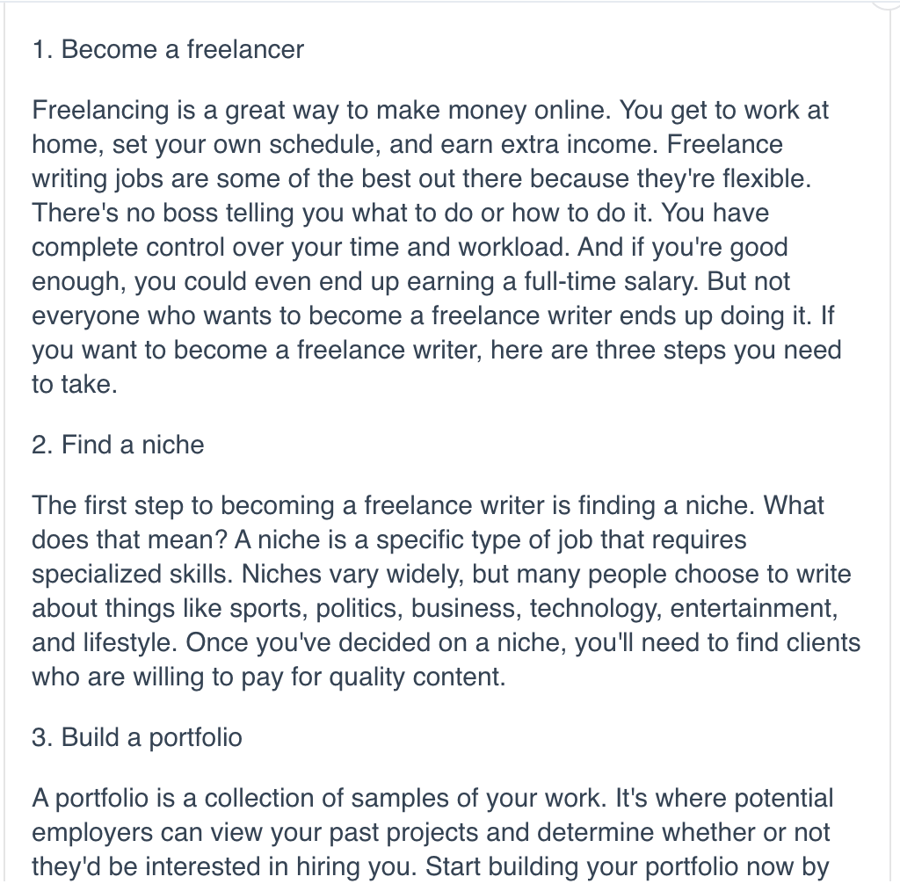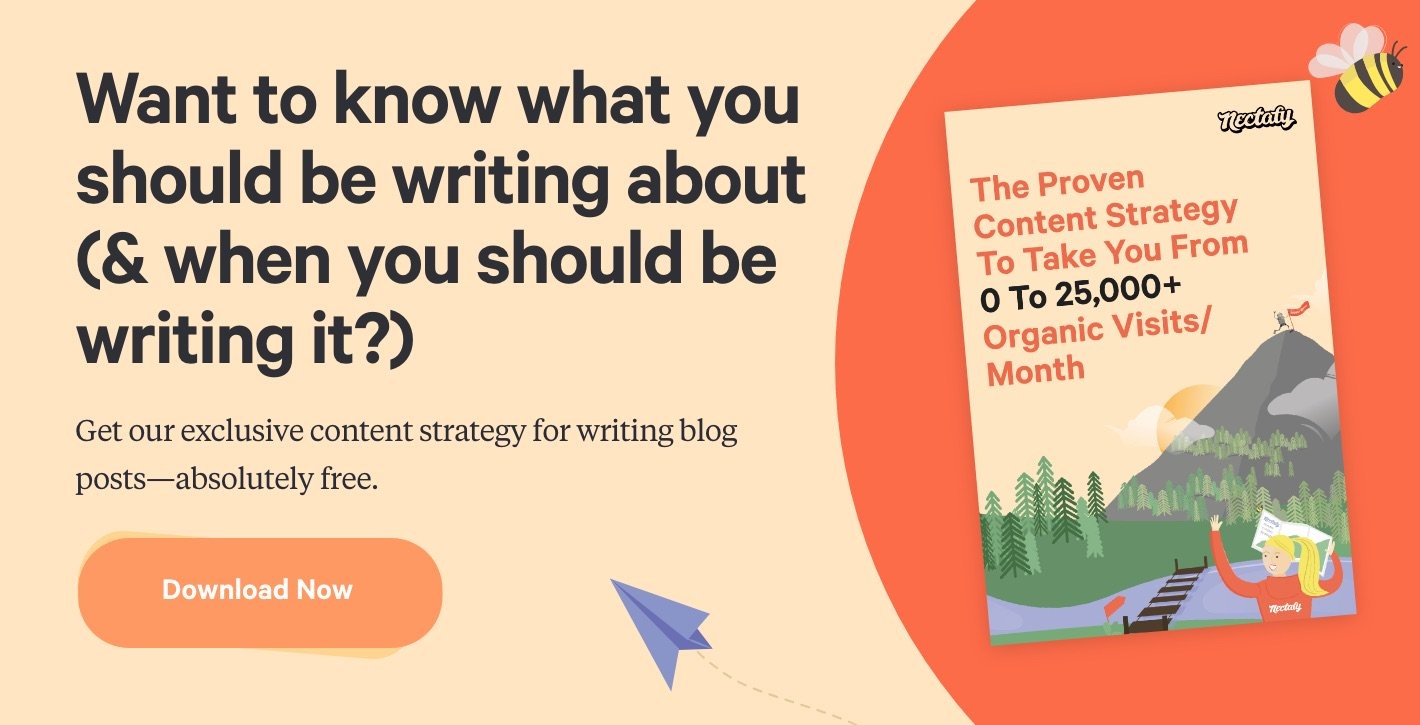We Tried Out Some AI Content Generators And... It's Not Pretty



AI content generators are giving AI a bad name.
Artificial intelligence, or AI, does have a lot going for it—it’s helping businesses process and analyze unprecedented amounts of data; it’s helping keep our homes more efficient and secure… and about a million other things. Heck, some say it’s even “solving some of the most critical challenges faced by society.”
But one thing AI is not doing is elevating marketing content.
AI-generated content began ramping up just a few years ago, with the release of OpenAI’s GPT-2. Even then, in 2019, it caught the attention of Semrush, which fretted that “Yes, an AI-Generated Blog Can Rank—And That’s Scary.” Since then, the technology has advanced (most AI content generators make use of GPT-3), but has the end product advanced, too? Is AI content now a good substitute for human-produced content? Can it be used to market something effectively? And last but not least—should content producers pack it in and start figuring out where our other marketable skills lie?
Before rushing off to the job boards, we wanted to see what all the hype was about, so we gave some AI content generators a test run. Looking at the results, we’d just like to say: Robots, don’t quit your day job.
Want to break up with your AI content writer but not sure how to produce content otherwise? Download our simple, step-by-step guide, How To Generate Meaningful Organic Traffic To Your Website In 90 Days, to learn exactly what to do to reach your business goals.
Testing Out An AI Content Generator
Multiple members of our team tried out different content generators, including…
- Rytr
- Jasper AI
- ShortlyAI
- AI-Writer
- Surfer SEO
- CopyAI
- Frase AI
- Smodin
They all seem to work slightly differently, with some asking for a prompt, some asking for a title and keyword, some providing outlines, and others writing entire articles. Granted, we didn’t delve into this too deeply; rather, we were just dipping our toe in the water to see if the end product was:
- Readable (easy and enjoyable to read—a basic requirement for good writing)
- Helpful (a tenet of content marketing—it must be useful to your audience)
- Unique (as a marketer, your goal is to differentiate your brand through content, right?)
Let’s take a look at the results.
Here’s what ShortlyAI produced when I entered the title, “Tips for becoming a freelance writer,” and the first sentence:

Is it readable? In my view, no. How is “getting by with a regular job with a flexible schedule” a form of publishing your writing? And what does it mean to “Finish your dues”? And are you struggling to wrap your head around the advice that you should quit your day job because you won’t make money from writing right away? Hmm… I am, too. At this point, uniqueness and helpfulness have been mooted by glib misstatements, embarrassing non sequiturs, and semantic howlers. (Not for nothing does “Finish your dues” sound like a linguistically ingenious riff from a stand-up comedy routine.)
I asked Frase AI for a similar article, with the title “3 Paths To Becoming A Freelance Writer.” Here’s an excerpt of what it produced:

Is it readable? More so than the first sample—at least the sentences make sense! However, the first “tip” is actually an introduction, and the following two points are “steps” to becoming a freelance writer rather than “paths” to take.
Is it unique? No. This advice appears in hundreds of articles about how to become a freelance writer.
Is it helpful? Even though these points are key to becoming a freelance writer, they aren’t covered in any depth, nor do they contain alternate perspectives that would be useful to readers. Thus, the content isn’t very helpful, and parts of it—like the introductory paragraph’s panacea-like depiction of a freelancer’s working life—are downright misleading.
Another example:
We gave Rytr a spin with this title:
“AI-generated content has no future in content marketing”
What we got back:

As you can see, this product doesn’t clear the bar for readability, helpfulness, or uniqueness. Who is Daniel Whitenack, and why bring him up? What concerns does he have, exactly? And is the AI “writer” just regurgitating this from some other source, such as a website? (Hey, Siri—some help, here?)
None of the above examples pass muster when it comes to good writing; nor do they live up to the expectations of traditional content marketing, which aims to produce relevant, helpful, unique content that will be appealing to your ideal audience.
.png?width=200&name=ai-content-generator-a-new-google-commandment-thou-shalt-be-helpful-or-else%20(1).png)
A New Google Commandment: Thou Shalt Be Helpful… Or Else
As of August 2022, it no longer pays to produce unhelpful content if you’re hoping to climb the ranks of Google Search results. That’s because Google has just released a new “helpful content” update that is “part of a broader effort to ensure people see more original, helpful content written by people, for people, in search results.” While AI-generated content isn’t specifically mentioned anywhere in the explanation, it’s safe to assume that it’s the target of this update simply by virtue of the fact that AI articles are generated by robots (not people), and they don’t feel “authentic and useful.”
This is Google’s first real attempt at screening AI content out of search results. But can they really do that? How would they identify it? It’s possible they may be able to measure certain indicators associated with poor content, such as a low time on page or a lack of scrolling, and perhaps give them more weight.
Given the almost certain lack of a definitive methodology, Google’s update could spell the end for more than just AI-generated content; it could also sound the death knell for low-quality content altogether—even the kind produced by humans. (You can read more about that here.) For now, though, the main takeaway is this: Being unhelpful isn’t helpful for SEO.
AI-Generated Content Is Not Helpful—And It’s Also Not Yours
Another bone we have to pick with AI content generators has to do with where the content is coming from. We’re not computer scientists, but it seems as if these robots are culling material from websites and attempting to string the already published ideas (and often, words) together into new articles. This is not writerly synthesis; it is rather a repurposing and amalgamation of cheaply obtained ingredients—the literary equivalent of artificial flavors or particle board.
Using SurferSEO’s AI content tool, Henry compared the article it produced on “AI content generation tools” with other articles on the internet, and found that they were nearly identical, word-for-word. The few sentences that were altered made no sense. Of course, that source information was not provided by the AI tool; Henry had to hunt that material down himself (which wasn’t hard).
Refreshingly, AI-Writer was less dodgy about where its bots were looking; it offered source links to the original material right within the draft:

As you can see, the sentences from the source material were only minimally tweaked (and for the worse, to boot).
Since when did plagiarism fall off the list of literary crimes?
Any marketer worth their salt (and any businessperson) would be against this type of text-appropriation—yet another good reason to avoid AI-generated content.
Why are we using AI content generators?
Considering all the above points, what’s the appeal? Why are so many marketers turning to this type of content?
From what we can tell, the biggest benefit is speed. The people who are using these tools are simply looking to publish more blogs faster. Speed is winning out over quality. But pushing out more content of dubious quality just for the sake of gaining more traffic isn’t good marketing; it’s mediocre or downright bad marketing.
In marketing, the goal is to stand out from your competitors. If 10 companies do Super Bowl ads that all sell soda, the most effective one will be different for some reason—it might be exceptionally funny or motivational, or simply better at showcasing the product. The same is true with content marketing. If you have 10 results in Google Search, the one that stands out will be the one that’s most engaging.
AI-generated content is incestuous, homogenous, and mediocre.
AI content is the opposite of marketing—it replaces solid, distinctive substance with a veneer of banal sameness. It takes whatever’s already been done a million times over, rewrites it more generically, and spits it out. Moreover, its problems with intellectual depth, factual accuracy, and semantic nuance have the effect of trivializing language and ideas, and ultimately, your product or service. There’s just no getting around it: If your goal is to stand out—and get meaningful results—you have to put in time, effort, and creativity.
How much could your company grow with growth content?
Calculate your expected growth in organic visits based on the average Nectafy client.
Get all these numbers in your inbox.
So how do you produce high-quality, helpful content?
Even if you aren’t using AI tools to generate blogs, sending low-quality human-produced content out into the world won’t do you any favors either. For one thing, it would likely have a negative impact on your SEO rankings from here on out. For another, it would fail to engender trust and goodwill in potential customers. (Think of it as empty calories.) So if you plan to use content as a strategy to grow your company—what we call growth content—you must commit to doing it right.
It goes without saying (but I guess we’ll say it anyway) that having a good writer and editor on hand is the most elemental piece of content creation. As the robots have amply demonstrated, it does take a sophisticated level of skill to craft a blog article. You can certainly learn it (the verdict is not yet in on whether or when machines will), and it’s certainly one worth cultivating! But consider this piece a requirement.
Another strategy to make your content more helpful is to interview subject matter experts (SMEs) for your articles. These experts might be people in the industry, customers, or anyone at all who has knowledge or experience in the area you’re writing about. SMEs usually have a point of view they can expound upon. They might also have interesting stories to tell or valuable tips your readers won’t find anywhere else. Their input will make your article different from what’s already been published on the topic—and that’s exactly what you’re going for.
Strapped for time? One time-saving technique for producing content is to ask your readers for help! Is there a question you could ask that would prompt interesting responses? People love to know how other people handle certain challenges, for instance. You could also ask for advice, tips, or recommendations around specific areas of interest. Once you’ve gathered all the responses, collect them in a document, add some commentary of your own, and publish it all with links to your contributors. This strategy is win-win because:
1) It creates a sense of community among readers, which will serve to engage them more;
2) It saves you the time and effort of creating an article from scratch; and
3) Readers who are featured in the article are more likely to share it, which extends the reach of your blog.
If you’re still struggling to create high-quality content, hire a top-notch content agency to help. At Nectafy, that’s our mission: to help businesses grow through high-quality content. To fulfill it, we employ all of the above strategies and then some; take a look at our website to learn more. And if you’re already convinced that growth content is the path for you, set up a time to talk to our founder, Lance—he’d love to hear from you!

